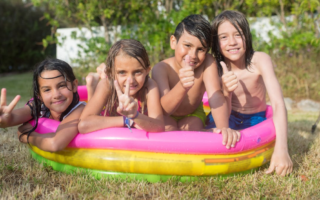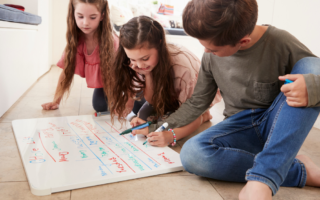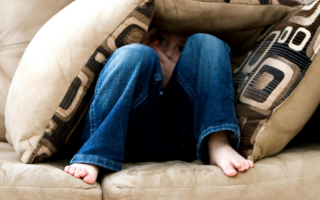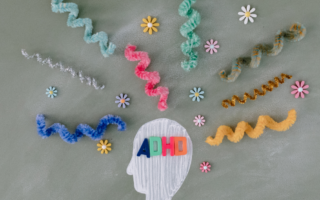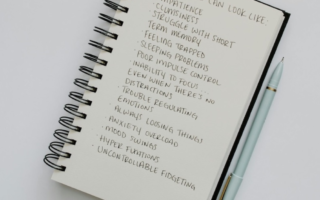Traveling over spring break with kids who have ADHD can feel like a wild mix of excitement, chaos, and a lot of deep breaths. I’ve been there—packing snacks with military precision, planning every hour (only for none of it to go that way), and silently hoping the plane trip or long car ride doesn’t end in a meltdown. But here’s the thing: it gets easier as they get older—and spring break can actually become one of the best opportunities to bond with your kids, especially when you embrace their creative, energetic, always-on-the-go brains.
My family will be heading out of town for our break and I thought I would share some practical tips and real-life reflections for traveling with kids and teens with ADHD. Whether you’re hopping on a plane, hitting the road, or planning a staycation with some local adventures, there are ways to make spring break fun, flexible, and full of connection.
It Gets Easier—Really, It Does
When my kids were younger, even the idea of traveling made me anxious. The packing alone felt like prepping for a week in the wilderness (with fidget toys, backup clothes, a white noise machine, and three different types of snacks). But as they’ve grown, I’ve seen something shift.
Older kids and teens with ADHD may still struggle with focus, impulsivity, or transitions—but they also start to develop better coping skills. They can help with planning, understand schedules, and express themselves more clearly when they’re overwhelmed or overstimulated. Plus, as they grow, they often become more curious, more adventurous, and more excited to explore new things.
Travel becomes less about survival and more about discovery—and that’s where the fun really begins.
Why Spring Break Is a Great Opportunity
Spring break offers a natural reset—a chance to step out of the daily grind and explore the world (or even just your own backyard) together. For kids and teens with ADHD, who thrive on novelty and stimulation, travel can be the perfect outlet for their boundless energy and curious minds.
Here’s why travel can be a win:
- New environments stimulate the brain. ADHD brains love novelty, and traveling offers new sights, sounds, and experiences that can actually improve focus and mood.
- It strengthens family bonds. Sharing new experiences, even silly or frustrating ones, helps you connect on a deeper level.
- It encourages flexibility. Things won’t always go as planned—and that’s a chance to practice resilience, patience, and problem-solving (for both of you!).
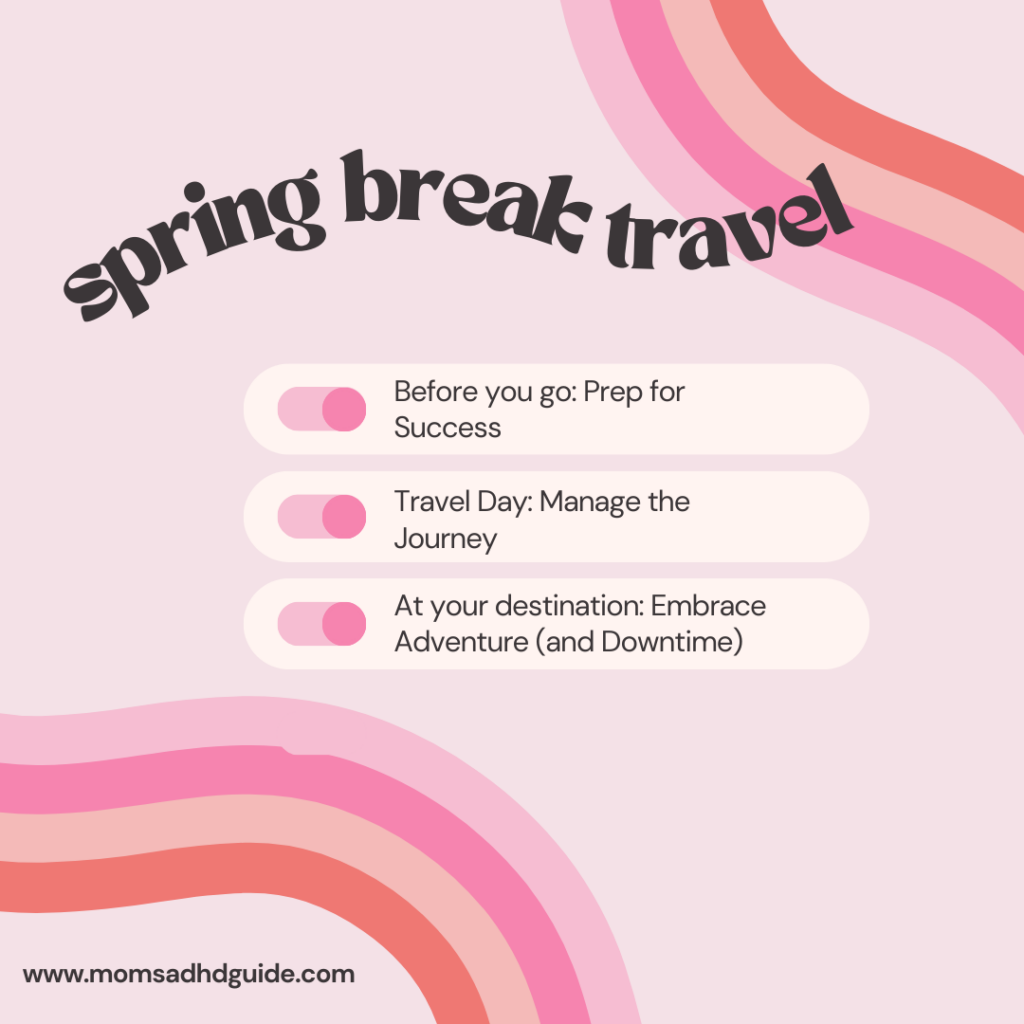
Before You Go: Prepping for Success
A little preparation goes a long way when traveling with ADHD kiddos. Here’s what’s worked well for us:
1. Involve Them in Planning
Give your kids a sense of control and ownership by letting them help plan part of the trip.
- Ask them what types of activities they’d enjoy.
- Let them help choose a restaurant or a place to visit.
- Show them pictures of your destination and talk about what to expect.
When kids feel involved, they’re more invested—and more cooperative.
2. Set Expectations (and Flexibility)
Create a loose plan for each day and share it with your kids. Visual schedules work well for younger ones, while older kids may prefer a digital version.
- Explain what’s happening and when (e.g., “We’re going to the museum in the morning and the pool in the afternoon”).
- Let them know it’s okay if plans change. Flexibility is key, and showing them that change isn’t the end of the world builds valuable skills.
3. Pack ADHD-Friendly Essentials
Make sure you’ve got their comfort and focus tools ready:
- Noise-canceling headphones or earplugs
- Fidgets or sensory tools
- Healthy snacks to regulate blood sugar
- A journal, sketchpad, coloring books, or Kindle
- Sleep aids like a weighted blanket, melatonin (if approved), or a favorite stuffed animal
- Supplements / Medications
Travel Day: Managing the Journey
Let’s be real—travel days can be challenging. But they don’t have to be disasters. With a little creativity and some patience, you can help your child manage their excitement (or anxiety) and stay regulated.
1. Keep Them Informed
Explain every step: from checking in at the airport to going through security, or from rest stops on a road trip to arriving at the hotel.
- Kids with ADHD can get anxious when they don’t know what to expect.
- Use simple explanations, or even role-play if your child is younger.
2. Keep Them Engaged
Bring activities they enjoy and rotate them throughout the trip. Think games, puzzles, coloring books, audiobooks, or music playlists. For teens, podcasts or engaging apps can help too.
- Try “brain break” games: I Spy, 20 Questions, or scavenger hunts in the airport or along the drive.
- Activity books are a great way to keep kids occupied at restaurants or hotels during no electronics time.
3. Build in Movement Breaks
Kids with ADHD often need to move. Plan time for walking, stretching, or quick bursts of activity—especially during long travel days.
- Use layovers or rest stops as chances to burn off energy.
- If flying, walk the terminal before boarding. If driving, pull over for a 10-minute stretch.
At Your Destination: Embrace Adventure (and Downtime)
Once you arrive, give yourselves time to adjust and don’t feel pressured to pack every minute with activity.
1. Mix Active and Chill Activities
Plan a mix of stimulating activities (like visiting a zoo, hiking, or going to an amusement park) with downtime (like reading by the pool or watching a movie in the hotel room).
- ADHD brains need stimulation, but they also need breaks to recharge.
- Allow for quiet evenings or late starts after busy days.
2. Lean Into Their Interests
Does your child love art, history, science, or animals? Build those interests into your plans.
- Museums with interactive exhibits, nature trails, or planetariums can be both educational and exciting.
- Let older kids or teens research one place they’d like to visit and be “in charge” for the day.
When you align travel activities with their natural curiosity, you’ll see their engagement skyrocket.
3. Create Space for Connection
One of the best things about travel is the quality time it creates. Use it to connect in meaningful ways:
- Share highlights of the day over dinner.
- Laugh at the mishaps (because there will be mishaps!).
- Let them open up at their own pace—sometimes the best conversations happen during a walk or while stargazing on vacation.
Helping Teens Stay Grounded
Teens with ADHD might be more independent, but they still need structure and support. They also need space to feel trusted and respected.
Tips for Traveling with Teens:
- Give them more autonomy. Let them explore (with boundaries), manage some of their own schedule, or choose activities that interest them.
- Talk about screen time. Instead of banning devices, agree on reasonable boundaries for checking social media or playing games.
- Include them in decisions. Ask for their input on meals, activities, or even budgeting. It shows you value their opinion and builds life skills.
What Travel Has Taught Me About My ADHD Kids
Traveling with my kids has taught me things I never would’ve discovered at home. I’ve seen them step out of their comfort zones, try new foods, manage big emotions, and surprise me with their creativity and resilience.
When we travel together, we’re not just changing locations—we’re creating memories, building trust, and helping our kids grow.
Final Thoughts: Let Spring Break Be a Time of Connection
Traveling with ADHD kids and teens over spring break doesn’t have to be perfect—and honestly, it won’t be. But it can be beautiful, bonding, and even transformational if we allow room for both structure and spontaneity.
So here’s my encouragement to you:
✨ Plan what you can.
✨ Let go of what you can’t.
✨ Embrace the energy, the creativity, and the curiosity that make your ADHD child so uniquely them.
This spring break, try not to stress about doing it all. Instead, focus on doing it together—with patience, laughter, flexibility, and love.
Safe travels, and may your adventures be filled with joy (and maybe a few extra snacks in your bag—you’ll thank me later)! 💛
Do you have tips or travel wins (or fails!) with your ADHD kiddos? I’d love to hear your stories in the comments!



